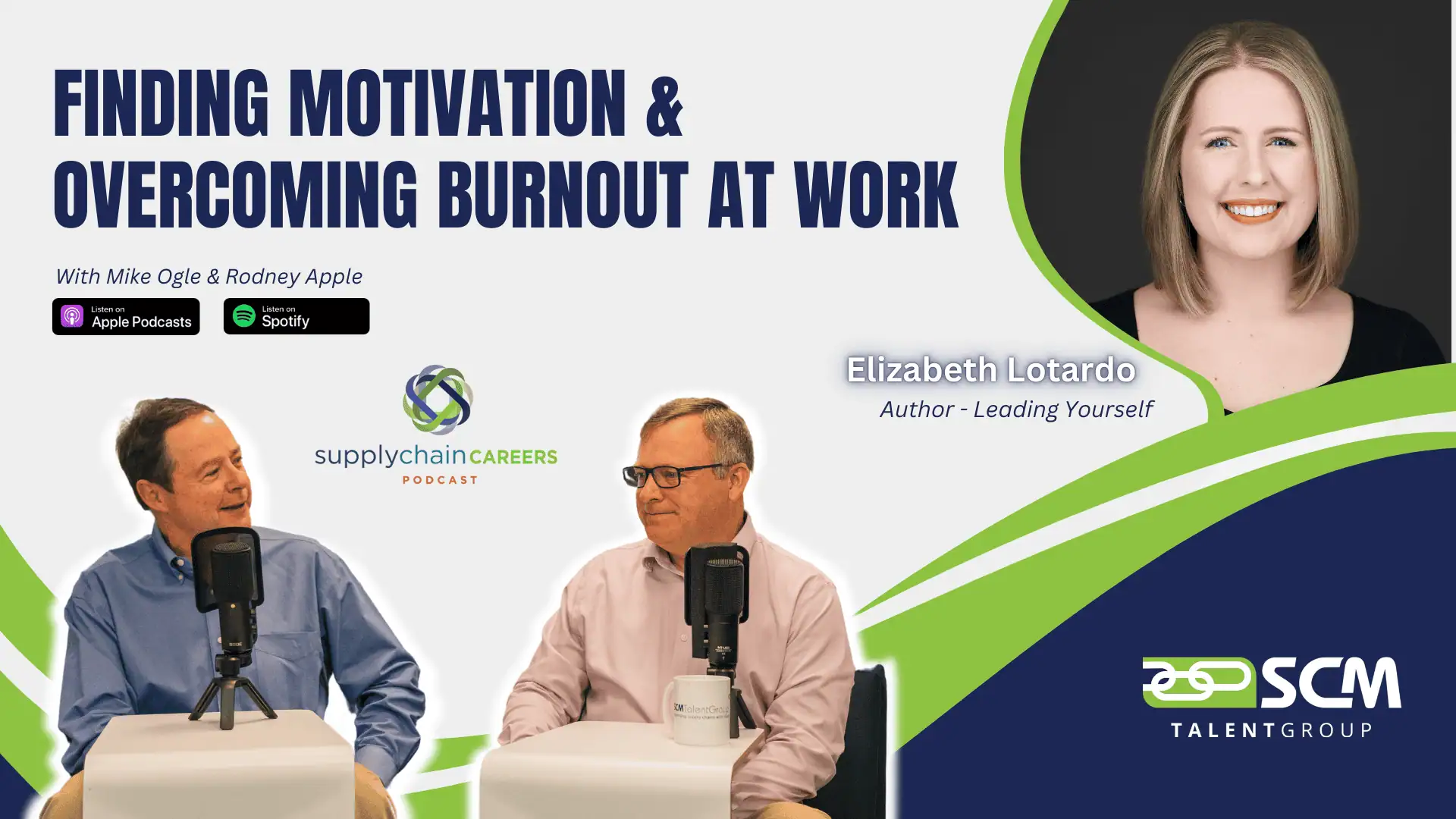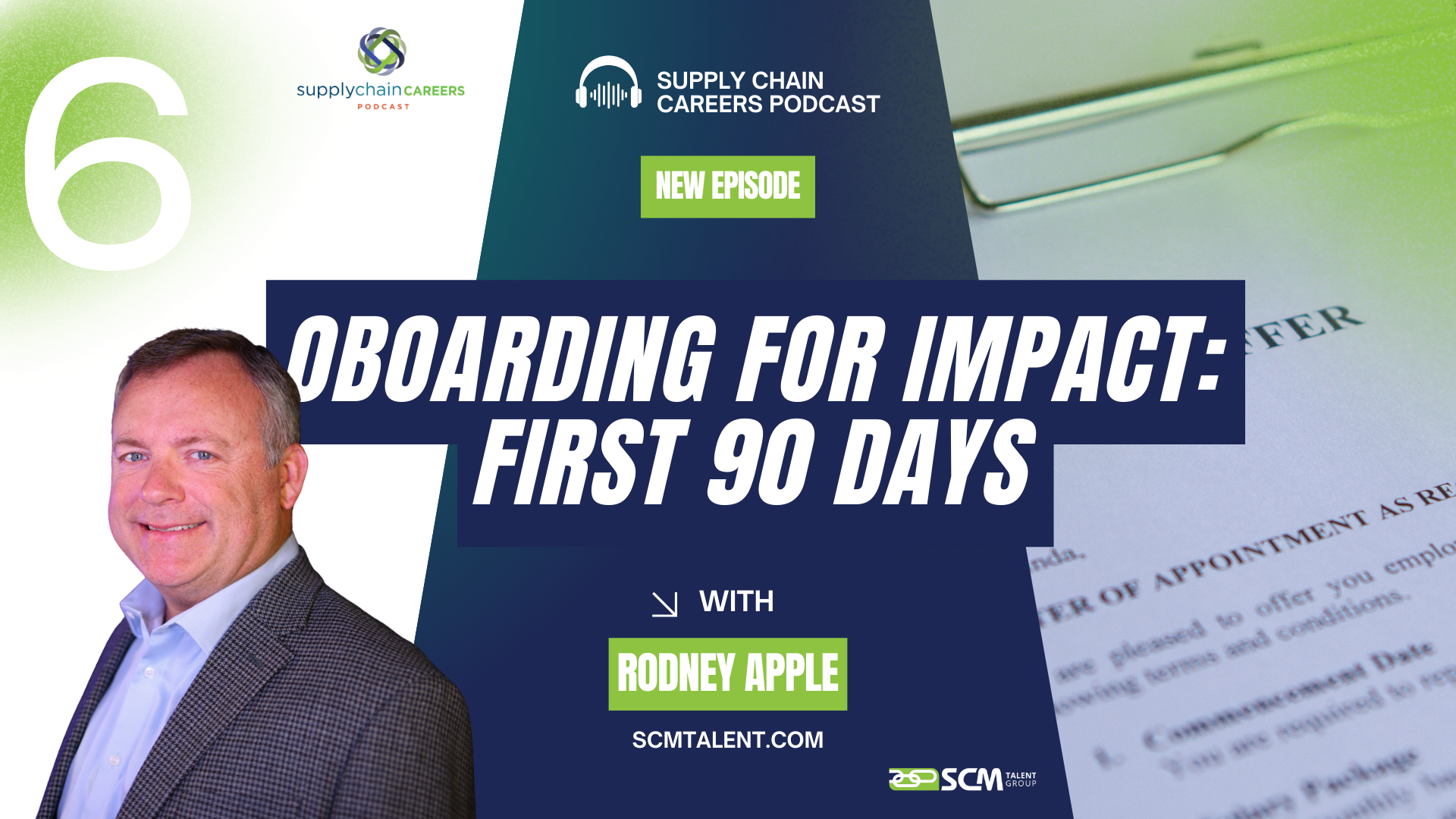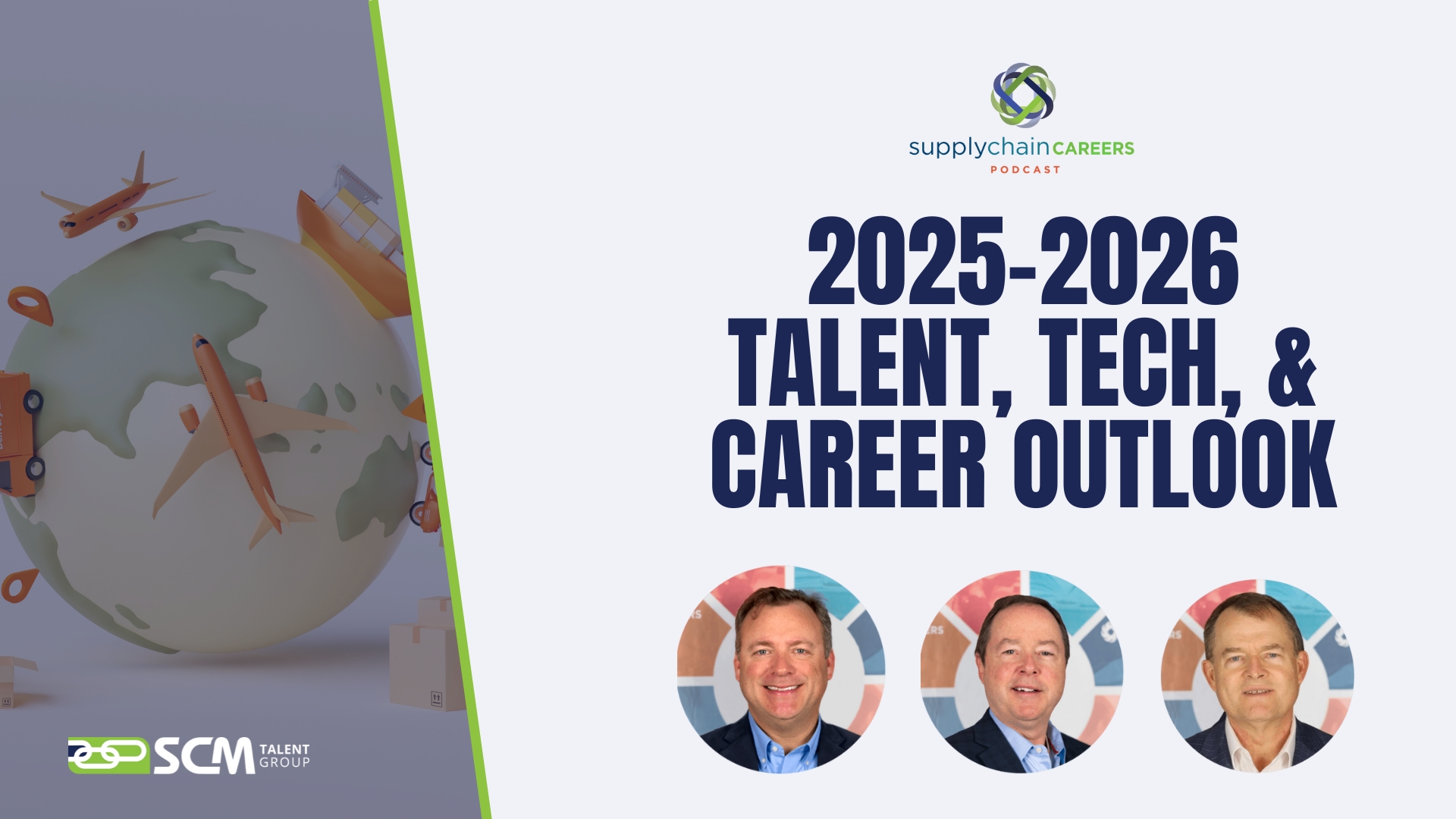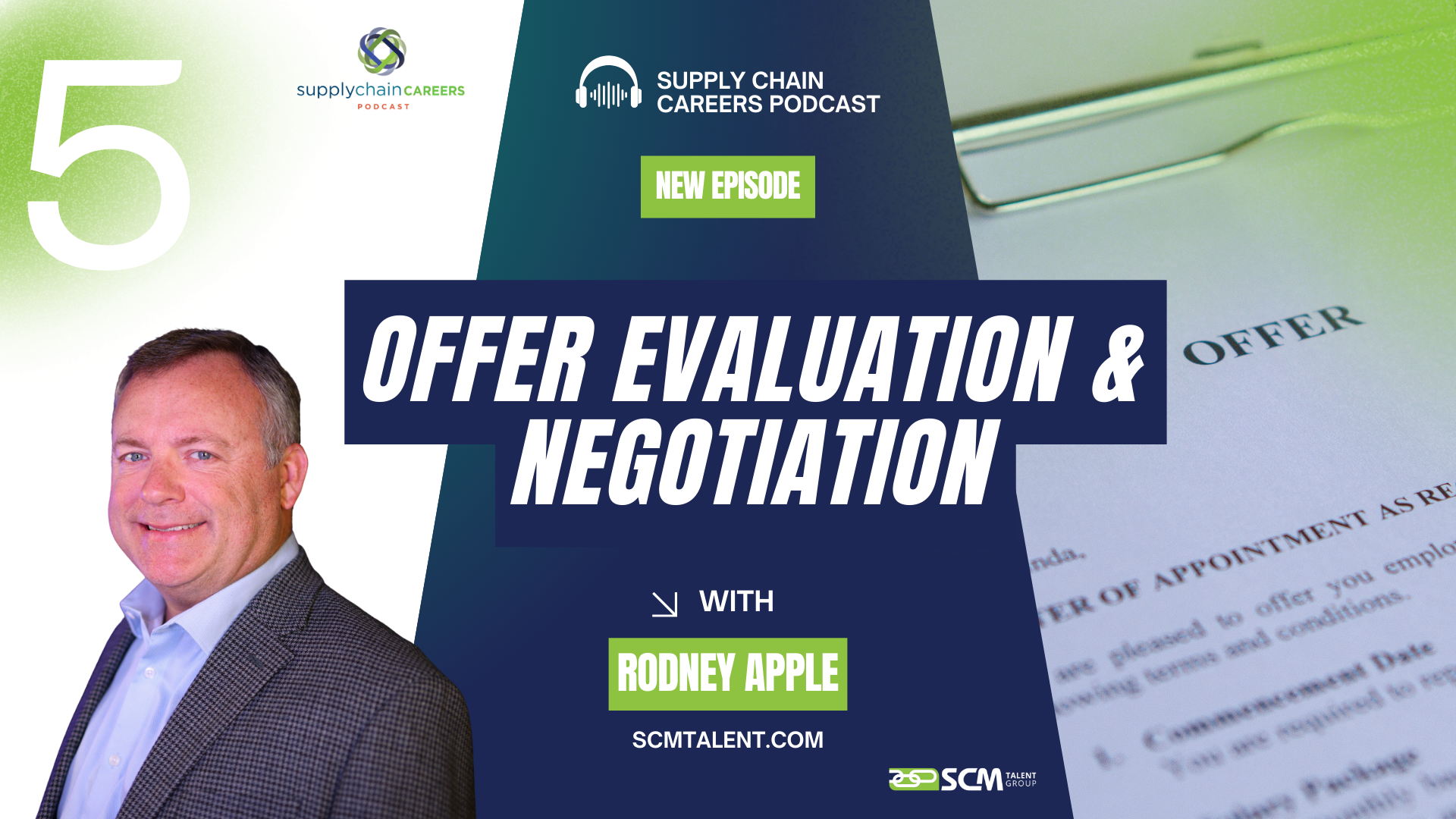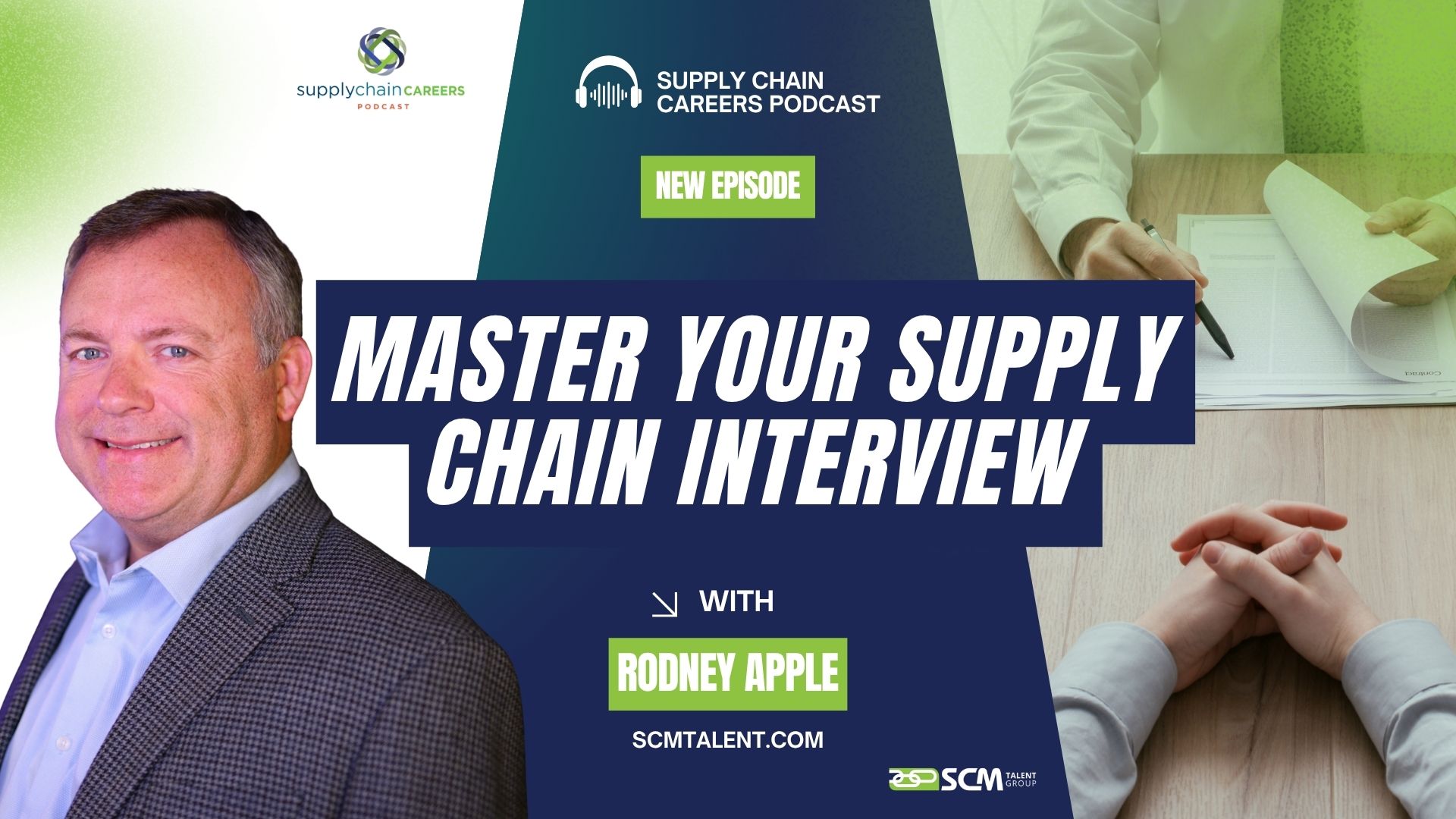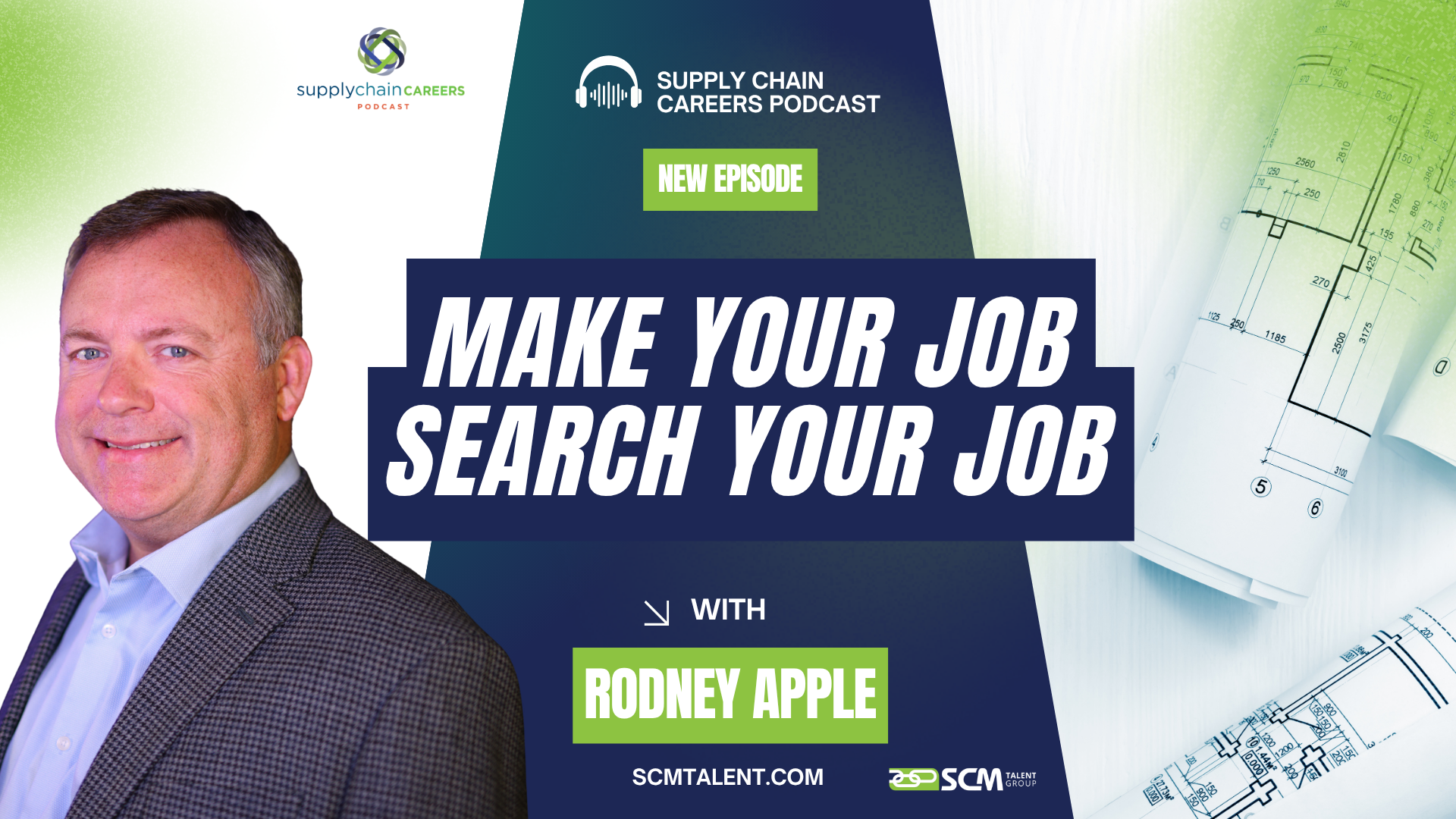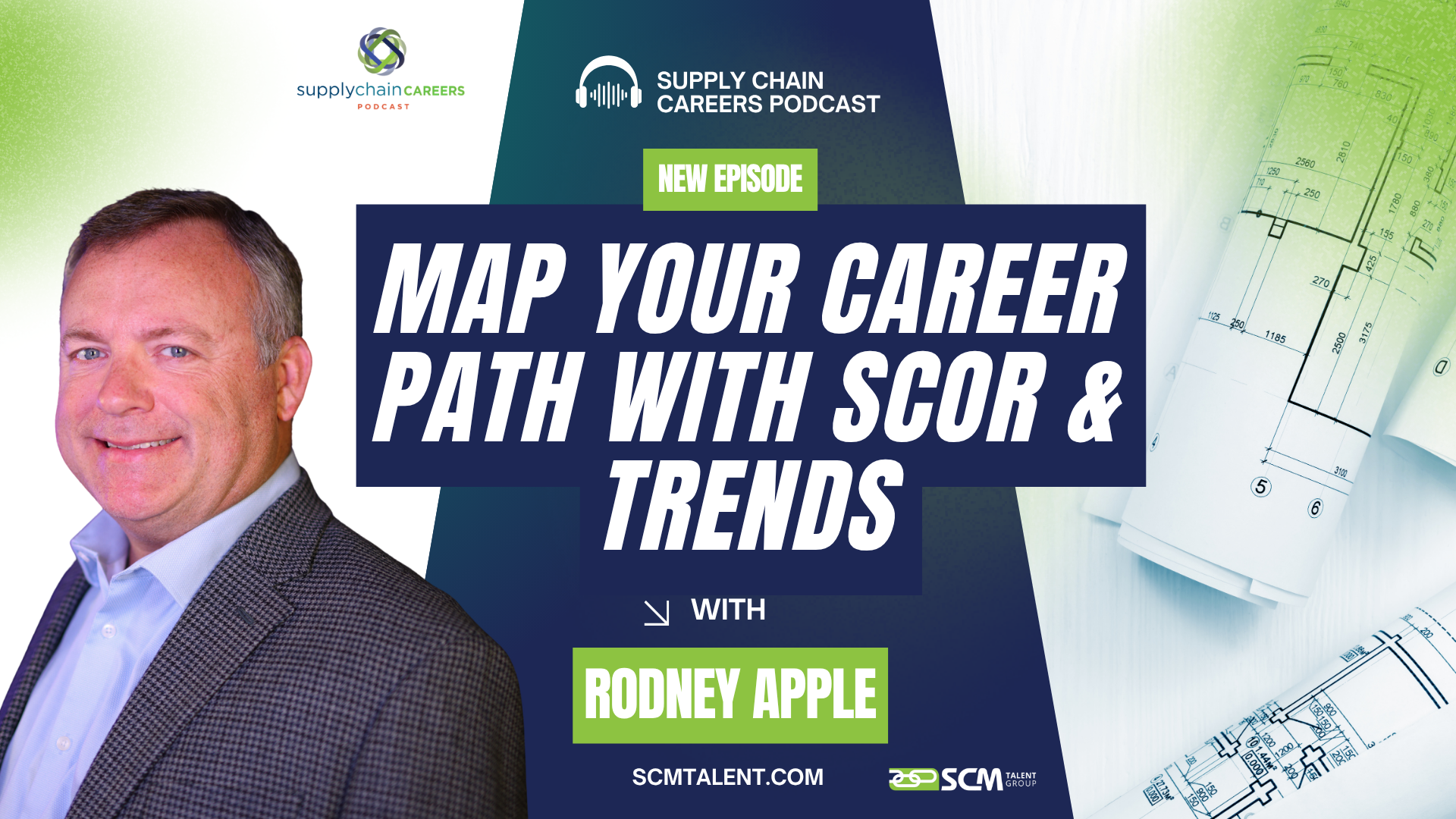[00:00:00] Mike Ogle: Welcome to the Supply Chain Careers podcast, the only podcast for job seekers, professionals, and students who are focused on career enhancing conversations and insights across all aspects of the supply chain discipline. This podcast is made possible by SCM Talent Group, the industry leading supply chain executive search firm.
Visit SCM Talent [email protected]. In this episode of the Supply Chain Careers podcast, we have an episode in our Talent Building and Engagement series. Our talent builder is Elizabeth Lotardo, a consultant, writer and training creator, helping organizations drive emotional engagement. She’s also the author of the book, leading Yourself.
Elizabeth shares what it takes to both feel better at work and perform better at work to create a fulfilling career, and how high performers have the ability to flexibly navigate through [00:01:00] changes and challenges. Hear the difference between compliance and commitment and what it takes to lead yourself even while you’re leading Others.
Hear about how the soft skills are incredibly important, hard stuff to learn and develop. Hear how that plays out in terms of learning the incredible value of context and perspective, particularly in supply chain where there are so many stakeholders and metrics. Elizabeth closes with our best pieces of advice, including how to follow your values and your moral compass.
I’m your podcast co-host Mike,
[00:01:32] Rodney Apple: and I’m your podcast co-host Rodney Apple.
[00:01:37] Mike Ogle: Elizabeth, welcome to the Supply Chain Careers podcast.
[00:01:40] Elizabeth Lotardo: Thank you for having me. I’m excited to chat today.
[00:01:43] Mike Ogle: So how did you get started in your own career and what are some of the key moments that led to advising people about their own career development?
I.
[00:01:52] Elizabeth Lotardo: I’ve always been fascinated with people and how they think and how they feel. I actually started out my career in advertising because I was [00:02:00] just absorbed with this study of what makes someone do something, what makes them feel something, and as I got deeper into my advertising career. I decided to, as I say now, transition and use my powers to good.
So I, I stepped out of advertising and went back to school for organizational psychology, focusing on employee engagement and again, how people feel at work, what makes them perform at work, what makes them stay at work, what keeps them engaged at work. And I built a consulting practice and a library of content based on exactly that with the end goal of helping people feel better at work and also do better at work.
[00:02:38] Rodney Apple: I think we all aspire to, to do those things and to feel better at work. So I was just looking at your LinkedIn profile and I noticed you, the first thing you’ve got there is I’m a consultant writer and a training creator who helps organizations drive. Emotional engagement. Can you share with [00:03:00] me what your thoughts are on this?
What does it mean to you and maybe how your, our audience should be thinking about this as well, how it resonates and whatnot.
[00:03:10] Elizabeth Lotardo: We’ve all. Experienced, or at least I hope all of you listening have experienced what it feels like to be emotionally engaged at work, to have energy, to enjoy the people you’re working with, to know that what you’re doing really matters.
That it counts for something. That’s the feeling. I try to. Create and scale in people. I do it through consulting organizations on how they’re onboarding their teammates, how they’re developing them. I do it through creating training programs about finding your purpose at work and self-leadership, and I write a whole host of free content on LinkedIn and on HBR about exactly that.
That’s special feeling. I think all of you listening, probably the two of you have also experienced the absence of it, what it feels like to show up to a job that. You’re not enjoying where you don’t feel appreciated, where you don’t see the impact you’re having. It [00:04:00] is a miserable feeling and it radiates out into the rest of your life.
So through all of my work, that’s what I’m trying to prevent.
[00:04:07] Rodney Apple: That’s an incredible mission and it absolutely can make a. An incredible, and I would say long-term impact if you know when companies get this right, but I would say employees get it right too. It’s a two-way street.
[00:04:20] Elizabeth Lotardo: Absolutely double click on that.
There is no perfect job. You are not going to find this level 10 communication manager inside of an organization with completely differentiated products operating in a booming economy. Like it doesn’t exist. The combination is not out there, so don’t hold your breath. For it, but being able to create meaning in your role, being able to find those pockets of joy and being able to build opportunities for yourself, that’s what creates a fulfilling career.
[00:04:52] Mike Ogle: Amen. And I would say that in one of the. Instances that that I went through in a position that I was at [00:05:00] for over 15 years with a couple of promotions in between it. Every piece of that ended up having highs and lows. And it’s a little bit of your attitude and what you bring and what you decide to do in helping to manage yourself.
That contributes to the staying power rather than feeling, oh, things are starting to go downhill, so then it’s over, or things are going uphill and it will always keep going uphill.
[00:05:25] Elizabeth Lotardo: Absolutely. The ability to operate, and I feel like changing times is a really overused term these days, but the ability to operate in changing times and flexing conditions is a trait of a high performing person, and it’s not something you’re born with.
It’s something you can teach yourself.
[00:05:41] Rodney Apple: I think that’s where in supply chain it’s, if anything I’ve learned in 25 years of recruiting in this space is that the change is just constant. It’s rapid, it evolves quickly, and that’s really, I think the toughest part to. To get down when you’re trying to lead some kind of change or [00:06:00] transformation.
It’s not the roadmap and the systems and the process and all that can be figured out. It’s the soft skills. It’s, and I know we’re gonna dive into that here in a minute, but it’s the influencing and getting the team on board and to buy into the vision and the why. And we see, when we get called out for searches, a lot of times it’s, it’s usually when someone.
It is not an effective and influential leader and maybe trying to be more authoritarian, driving with the whip, if you will do, as I say, and that I’ve never seen that work out.
[00:06:29] Elizabeth Lotardo: Yeah, the big difference between compliance and commitment, and I think we see that play out in a lot of ways and whether people are checking the boxes and turning a blind eye to problems that aren’t their responsibility versus when they are fully engaged, they’re collaborating across departmental lines.
And they are united as a team throughout any change that does happen.
[00:06:50] Mike Ogle: Exactly. So continuing with what’s in the about section of your profile, you recently wrote a book titled Leading Yourself. [00:07:00] So why is leading yourself becoming more important today and in the future? I.
[00:07:05] Elizabeth Lotardo: There’s a few reasons that prompted me to write this book.
I initially wrote a LinkedIn learning course on this topic about eight years ago, and what I saw during the pandemic in 2020 and in 2021 was a huge uptick in viewership on that course. And I think the reason was people felt the need to lead themselves when their manager wasn’t sitting right next to them all day when.
Circumstances were changing and they didn’t know what was gonna happen with their job. And when they wanted a deeper feeling of meaning at work, they wanted to feel like what they were doing mattered. That was the force behind what played out as the great resignation and those three things. Wanting to make a difference at work, knowing that your manager is not gonna hold your hand through at all.
Knowing that we don’t know what the future looks like, the sum of that is still present today, several years later, and I’ve only seen the need, need for leading yourself [00:08:00] increase. So that prompted me to deepen my studies and double down and create a playbook this year.
[00:08:06] Rodney Apple: Congratulations on that book and we definitely want to make our users aware of where to find the book.
I’m sure it’s out on the usual suspect, Amazon, but is there any, anything you wanna share there where uh, folks can find book, especially those that are maybe struggling or trying to find that enjoyment and passion in their excitement that you talked about in their career? Yeah.
[00:08:27] Elizabeth Lotardo: It’s everywhere you buy books.
And I also recognize that someone who is feeling burnt out and tired and stuck at work probably doesn’t wanna read a whole book. So if you email me your order number, I’ll send you the 40 minute video summary, and during your lunch break you can turn this thing around.
[00:08:45] Rodney Apple: Awesome.
[00:08:45] Mike Ogle: Very good. During this short break, we recognize that this podcast is made possible by SCM Talent Group, the industry leading supply chain executive search firm.
Visit SCM talent [00:09:00] [email protected].
[00:09:04] Rodney Apple: Switching gears here, a, as someone that’s been in, in recruitment for executive search 30 years and 25 in supply chain, we have. You always hear about the hearts, the hard skills and the soft skills, and before I, I’ll throw out a little story of the journey that I’ve experienced when it, as it relates, I’ve seen an inflection where I’ll say.
When I got into it, so 20, and I would even say the first 10 years, so this would’ve been in the late nineties and forward, right? All employers were complaining about the hard skills. Everybody had the soft skills back then and, but coming out with this advanced Yep. Advanced data analytics and working the systems and computers, all the lots of data in supply chain of course and operations.
Uh, we’ve seen that. That just completely flip. I would say the last 10 years has been, they’re coming outta school with the hard [00:10:00] skills, but the soft skills are just not there. And then it’s a pretty broad stroke that they’re painting. You find that then it’s becoming less common. So I would love to hear your thoughts on that dynamic.
And then where may you have made worked or any examples that you may wanna showcase as it relates to that soft skills, hard skills, dynamic.
[00:10:19] Elizabeth Lotardo: I saw a post on LinkedIn where someone said the soft stuff is the hard stuff. The emotional intelligence, the teamwork, the leadership, all of that is a lot more difficult to learn than some new system.
And in a lot of cases, there’s not some perfectly laid out tutorial on exactly how to do it. There is the hard stuff. So I can certainly see where employers are frustrated with the seeming lack of soft skills. But soft skills is a huge bucket, and it’s one that is always changing. Communication looks.
Differently than it did 20 years ago. So unlike a hard skill where you learn it once and then you have it, these softer skills [00:11:00] like leadership, communication, managing yourself, those are ever present and they’re constantly evolving. So I, I think from an organizational perspective, what we’re seeing is a recognition of.
You can’t teach this stuff one time and expect it to just check the box for all eternity. And from an individual perspective, a true desire to learn these things, we are each the common denominator in our own work experiences. Every job you have, every boss you work for, every company you move to, there you are.
So your ability to develop these scoff skills that you take with you, that you apply to variety of settings, we don’t know what the hard skills are gonna look like 15 years. From now, but you’re certainly gonna have to communicate during them. I think individuals are seeing it as a wise investment in their own professional growth.
[00:11:47] Mike Ogle: Very much. I also wanted to ask, you’ve been through a lot of different situations with teams and individuals where you get engaged into a a situation. You’ve seen a [00:12:00] lot of challenges. Can you highlight a few of some of the most challenging situations that lead you to be or led you to be engaged by clients?
[00:12:09] Elizabeth Lotardo: I’ll tell you one of the most challenging that I think is gonna really land with supply chain professionals, and that is someone assuming that everyone else has the context that they do. And I’ll tell you how it plays out. Someone will call me and say, no one in my company gets it. The ultimate professional insult.
They don’t. Get it. And what they mean is they’re not seeing what I’m seeing in terms of context. And because they don’t understand the interconnectedness of these things, there’s a lack of urgency, there’s a lack of accountability, and there’s lack of engagement. And I think that plays out really frequently for supply chain professionals because supply chain professionals have great context.
Their hands are in so many parts of the business. They see how all [00:13:00] these things fit together. They understand the ranking of it all, how it’s all interwoven, and they’re often frustrated that people who are operating in a specific department. Aren’t seeing that, and they’re making demands that are impossible.
They’re not seeing the ripple effect of what they’re asking for. They’re not fulfilling things that other elements of the business are depending on. So that can create a really frustrating experience because on the supply chain leader side, you feel like you’re operating in an island and you’re trying to do all these things.
You’re saying no, and they’re mad at you because everyone is lacking context. But. Every individual leadership authority aside has the ability to paint that context and to take the one extra minute to describe why something matters, how it’s connected, and help the person on the other end, see how all of these things are woven together.
[00:13:56] Rodney Apple: I think you hit the nail on the head there. The supply chain is a very diverse, it’s [00:14:00] very broad. It encompasses many different functions, departments. Uh, you think about the operation side, then you’re going into physical buildings and they’re in different places and different locations. You got different cultures, different communities, and it’s multicultural and especially as you go global and, but then you have the all important and the external piece, right?
So it. It’s from the suppliers and service providers that you use to the other side of that coin, which is the all important customers that you’re trying to serve as well. And, and I, growing up in supply chain, you’d hear this term, the silos, the functional silos, and they’re all rarely on the same page, and they all have their own objectives and they start competing with one another versus doing what.
Is, you know, what’s best for the overall organization or what’s best for the customer. So you hear that term integrated supply chain, where you’re trying to get everybody on one page, one vision. That’s, to me, that’s like you get to that state, it’s one system and one common set. Of goals and objectives, [00:15:00] that’s when you can really do some amazing things.
But we don’t always see that
[00:15:04] Elizabeth Lotardo: or see it to the degree that we want to. And I think that’s what it comes down to is supply chain leaders have a bigger variety of stakeholders of metrics. Of decision making factors than almost every other leader inside of the organization. And because of that, it is often their responsibility to do that.
But what was your term? Integrated supply chain? Yes. To enact that. Ideally it’s coming from the CEO and other senior executives, but I would suggest, and you tell me, or the expert here, is that can be jumpstarted by an individual contributor with a couple of conversations.
[00:15:42] Rodney Apple: I think so. Yeah. Yeah. You want that.
Uh, the best ideas sometimes come from the folks that are on the ground floor, on the shop floor that are doing the work, and so it’s just a hallmark. I was just talking to one of our recruiters this morning. We’ve got a multi-site search e-commerce company, [00:16:00] and they are drilling extremely hard into.
Making sure they have. ’cause everybody says, oh yeah, I’m out on the floor. Of course they don’t always get out on the floor and lead from out front. And you’ve gotta be able to do that. And you’ve gotta make relationships with the associates and you gotta listen to them, seek out their input. ’cause the moment you start.
Pushing. This is how we’re gonna do it. We’re gonna do it this way. You get that resistance, and I’d love your opinion. It feeds right into our next question is when you think about how people and teams approach big changes, big projects, transformations, if you will, some of these transformation supply chain can be multi-year.
We’ve supported one with a client that was. Five plus years, but it was well thought out. They had a roadmap. We were there in the very beginning and in the very end, and helping them fill critical roles throughout. And, but what do, what can you tell us about approaches to change management from what you have seen through your lens?
[00:16:57] Elizabeth Lotardo: Especially now, I think our collective [00:17:00] gut reaction to hearing that there’s going to be a major change is exhaustion because so much change has been thrust upon individuals and organizations over the last five years. So I wanna validate that people are often coming to this from a place of burnout and tiredness, at the very least.
Having said that. Being exhausted costs you personally a lot. This changes moving forward, whether you’re tired or whether you’re enthusiastic. So you have to find a way for your own personal satisfaction to get yourself at least a little bit on board. So how do you do that? First, try and articulate the upside, knowing what is at the end of this, the positive elements of this, even if it’s not all positive, even if there’s some parts you disagree with, tethering yourself to that.
Matters a lot for our individual energy, for our engagement, for our motivation to our ability to withstand some changes or some bumps in the road. So when you’re hearing about a change, you first [00:18:00] wanna articulate the upside. The second thing you wanna do, and I’m glad you, you use this example of a five year roadmap, is you want to give yourself incremental wins.
Staring down a pipeline of five years, we are in TikTok land. Our attention span would barely last five minutes, right? You need to give yourself some type of win along the way, and that I did it. Feeling that’s going to play into your momentum to hit the next phase.
[00:18:25] Rodney Apple: That’s ins great textbook advice right there.
Get the good wins, build the momentum, get the team excited, celebrate the wins.
[00:18:32] Elizabeth Lotardo: Yeah, again, we know this best practice, but so often that practice is given as advice to CEOs and my position with leading yourself is. That is the ability and responsibility of an individual person to articulate the upside, to recognize and identify quick wins, to make sure that their personal energy is sustained through this.
It’s not just some big vision by the CEO though. That is nice to have. And
[00:18:59] Mike Ogle: Elizabeth, how [00:19:00] often do you feel like you go into a situation where it’s more like couples therapy?
[00:19:05] Elizabeth Lotardo: I think it’s more like family therapy ’cause there’s a lot of people involved. But listen, people are people, and you both have seen this in your careers, right?
Whether we call it it, employee engagement counseling, whether we call it therapy, whether we call it self-help guru, what we’re trying to get at is how do we improve the way we think about ourselves, think about our work, work with each other. So many of these emotional undercurrents are the same. So I’m not a licensed therapist.
I don’t wanna claim that I am, but I certainly, I think some of the conversations are probably similar.
[00:19:39] Mike Ogle: And the next question I wanted to ask was, or typically we end up going through each of our podcast sessions and asking people to provide some of the best advice that they’ve received over the years.
So you establish your own mentors and networks and such, and. Yeah, over time there are things that you pick up, of course, [00:20:00] and then there are those that you discover on your own. So do you have a few things that people have shared with you and a few that you want to share with our listeners?
[00:20:08] Elizabeth Lotardo: One of the best pieces of advice that I’ve gotten in my career came from Dory Clark, who is a mentor of mine, and she wrote a book about this entire topic to play the long game, which is a really hard thing to do now.
Every time you do it, you do yourself a giant service. Playing the long game in terms of your own professional growth, playing the long game in terms of what you’re building inside of your job, playing the long game in terms of the reputation you’re developing inside of your industry. Always be looking at a horizon longer than your next.
Performance review, which in a time of burnout, in a time of change, in a time of too much to do, is a challenging thing to do. It’s challenging for me too. It’s challenging for everyone. That’s why she wrote a book about it. But to me, the best career advice I’ve ever received is to [00:21:00] play the long game and not think transactionally about the near term.
Think about the that big, long vision. Every single decision that you make. The advice that I tend to leave people with and as the dedication of my book is the power is always in your Hands, and that is a lesson I have learned the hard way. And in organizations, especially big organizations, it’s tempting to zoom in on all of the things we can’t control, the systems that don’t work, that we didn’t choose and can’t change.
The people who are annoying that we didn’t hire and can’t fire the leader who changes their mind all the time, and we can never get a straight answer out of them, right? There’s no shortage of grievances that are outside of your control, but when you put your energy there, you cost yourself a lot and you cost the people around you.
Lot. The secret to employee engagement is an individual zooming in on what they can control, finding meaning, opportunities, and joy inside of that. So what elements of your job are you [00:22:00] uniquely responsible for? How do you make a difference? What is the ripple effect of that? How can you be the change you wanna see in terms of communication, in terms of modeling your values?
Zooming in on what power you do have instead of grumbling about what power you don’t have is the biggest indicator of satisfaction.
[00:22:18] Mike Ogle: Excellent. During this short break, we recognize that this podcast is made possible by SCM Talent Group, the industry leading supply chain executive search firm. Visit SCM talent [email protected].
[00:22:37] Rodney Apple: I had love to add a follow up there. I think maybe speaking towards the employers we have. We’ve worked with hundreds of companies over the years, and I have, I think we can all say we’ve worked with our fair share of those that didn’t really, they’ve got these, this beautiful words on their office wall, you know, where I’m going with this.
Their mission and especially their values, and you find that they’re just words and [00:23:00] they’re not living up to them. And, and in our world, operations supply chain, it’s, it tends to be where most employees are based. If they have. Factories, if they have distribution centers, that’s where you’re gonna have the bulk of your employees.
And we just, we hear it time and time again. I can certainly name some companies the, we’ll just say the ones that are in the news about this stuff all the time, where they just don’t do the right thing and you can’t go to the bathroom and have a break and you get penalized or threaten to get fired. But lesson here, I think, and what I love to hear with your perspective is.
We can do better. We need to do better, right? We need to create more meaningful work environment. Same question Mike asked, but maybe flipping it over to like employers. What would you advise with some of the best advice or maybe even some of the best practice you’ve seen that employers have taken on to, to make more of a meaningful drive, a better culture, however you wanna phrase that.
[00:23:52] Elizabeth Lotardo: I think the temptation for a lot of employers, and one of the reasons we see the disconnect that you spoke about between what we say we’re about versus what we’re [00:24:00] actually about is creating a false dichotomy between a high performing business and a high purpose business. And we know that a tier players do both.
So remove that belief from your mind. If you’re sitting here saying, we don’t have time for our values, and bathroom breaks because we have money to make. All of the research tells us that the businesses who center themselves on a purpose, who do live by their values. Outperform the competitors, especially in times of change or economic uncertainty.
We know what this looks like now. It 30 years ago, this was not a study. People didn’t go to school to analyze this. Now we do. So you have strong data to back you up in this notion that you should live by your purpose and values. But it’s not always easy. The first company that came to mind when you brought up, they have these values.
They don’t say them or they don’t live by them. Ronnie was Enron and they had the value of integrity. I. Etched in stone in their [00:25:00] Marvel lobby, which was just really awkward when the lack of integrity hit the headlines. On the one hand, we know there’s huge benefit to operating this way. There’s also a risk to not, so back to playing the long game, it may not bite you today, but rest assured.
It will. We know it does. So as an organization, if you are trying to live more of that purpose, to bring your values front and center, the best thing you can do is talk about them, connect the daily operations, the numbers we care about, the things we’re doing, the priorities we have. To the why, to your purpose, to your values.
You are always as a leader, building that connection between all the stuff we’re doing and why. The more you can do that, I think the less at risk you are for being somewhat like an Enron, where your values become an absolute jerk, and the more you have to gain to be one of those standout employers who do in the long term outperform their competitors.
[00:25:58] Rodney Apple: Well said. Yeah. And I [00:26:00] hope this isn’t, oh, I was just gonna say, as a follow up to that question, and this is my last one, I promise. Are there any values, now that you’ve worked with a lot of different companies on consulting and whatnot, but are there, is there, are there any, is it one, maybe two, or three that in your mind.
Should be codified with all companies and all employers. I have one myself, and it’s number one for our company, and it’s valuing honesty and integrity, just like the opposite of what you talking about a minute ago with Enron, but it’s just something that we don’t waiver on. I don’t care if you’re billing, you’re the highest biller in the whole company and everyone loves you, but if you have moral compass issues, it’s not gonna work out.
But I’d love to hear your opinion on that.
[00:26:45] Elizabeth Lotardo: I like your language of moral compass issues, right? There’s lots of phraseology we could attribute to those, whether it’s integrity, whether it’s honesty, whether it’s commitment, but I think operating by a moral compass in general is a value that should be [00:27:00] institutionalized in some way.
Whatever language you put to it. Not everyone lands with the word integrity, but. Languaging that and keeping it alive inside of the organization is just the right thing to do, first of all, and the data tells us something that is really closely connected to business performance.
[00:27:18] Mike Ogle: Well, it sounds like we’re very much aligned on that one.
Then when we look at business performance, and you’re talking about the long term purpose side of things rather than the short term transactional side of things, we tend to end up getting reviewed. On a basis that tends to be a whole lot more transactional. What did you accomplish? What goal? What did you meet on certain metrics?
How do you hope it’s not too much of a wild card here, but how do you work with your boss and your peers, your customers and such in trying to help understand, hey, here’s how we’re putting the long-term purpose side [00:28:00] into this as opposed to the transaction.
[00:28:03] Elizabeth Lotardo: That’s a great question, and I think it comes back to something we scratched the surface on earlier, which is the false dichotomy between purpose and performance.
And it all comes down to the language. So as a leader, when you are presenting some type of metric, the metric that you want people to meet is not because you, the leader said, so we have this metric. Because we have a purpose, because we have a big vision to fulfill this, to make an impact on our customers, to lead our industry.
Because of this thing, we have this metric and where we start to feel transactional is when the Y story vanishes and all that’s left is the metric. There was an interesting case study in the, in a Harvard Business Review about that, and they called it. Strategy Surrogation. And it’s exactly what happened to Wells Fargo.
So if you remember, a few years ago, maybe four or five years ago now, Wells Fargo had that giant scandal about their salespeople creating fake accounts. And when you [00:29:00] dig into. The transcripts of the town halls, they’re publicly traded organizations. So you know, every org psych nerd like me is psychoanalyzing them.
At this point. When you dig into the language it was originally put forth that we want to make an even bigger impact on our customers. We wanna improve their financial lives, and because of that. We want to use the not great customer word, cross sell. We want to offer them more solutions. We want to improve more elements of their financial future.
If we have a mortgage with them, we want to be able to improve their retirement. Also, if they’re investing with us, we want to be able to offer them credit cards that give them points and improve their access to things. So that was the core over time. All that good stuff vanished away and everyone was getting screamed at because they weren’t cross-selling.
So the risk of not connecting these things is becoming transactional at best, and landing yourself on the front page of the news at worse. [00:30:00] But again, you’re not powerless if some leader is coming at you saying, why is your metric yellow? Supposed to be great. You yourself can trace the ripple effect of that metric.
You can try and articulate why it matters. You can connect it to your organization’s purpose, and you can decide what inputs you have that drastically increase the likelihood you meet that metric. You are not responsible for the entire world, right? Most metrics depend on. The economy going decently, people fulfilling things, other people and organizations holding up their end of the bargain.
When we extrapolate out what we are in control of and when we can articulate why that actually matters, that’s when things start to feel less transactional. Ideally, your CEO is doing it. Ideally, your manager and HR are having this conversation, but if they’re not, don’t be too hopeless. You can do this yourself.
[00:30:51] Rodney Apple: Elizabeth, this has been enlightening. This has been great. You’ve, we’ve validated some things and it’s been great to hear your insights and [00:31:00] perspectives on leadership and leading yourself. I think just to wrap up before we close, we. With our own leadership series podcast as part of our Supply Chain Careers podcast.
So that series, it evolves and I do think it’s linear, leading yourself, getting good at that before you lead others, and then before you lead other leaders. And we culminate our series with getting to the place where you lead the overall supply chain. But would love to hear your maybe a little philosophy.
On that linear is that the, is what you traditionally see is this kind of, you go from one to the next in terms of progression.
[00:31:37] Elizabeth Lotardo: Probably to me, I think it’s more of a build. I don’t wanna imply that once you start leading a team, you stop leading yourself, right? You are always leading yourself and then you layer on a team and then you layer on more direct reports.
So I don’t know if it’s as much of a line as it is more like a, a build, but now we’re getting into real consulting mumbo jumbo. But the part [00:32:00] of it’s true, you are the common denominator in all of your work. Place experiences and the conditions are never going to be perfect. Your ability to lead yourself sets the stage for how much happiness you find in your role.
It sets the stage for your ability to lead other people, and it sets the stage for your next play. If you can’t do it, you are gonna be rinsing and repeating today for a really long time.
[00:32:22] Rodney Apple: Yeah. You may have to go back and take that lateral or a step down to, or a lot of self-reflection to figure some things out or some coaching and mentoring and
[00:32:30] Elizabeth Lotardo: all that.
Yeah.
[00:32:31] Rodney Apple: Yeah. Go ahead.
[00:32:32] Elizabeth Lotardo: There’s tons of resources. Our development of ourselves is never really done right? So I don’t wanna imply that you master self-leadership and then you check this box and you get to go lead other people. Because our environment is always changing. We always have to be changing. So making, leading yourself a cornerstone of your career and taking that with you between roles, as you gain more responsibility, it serves you and it serves everyone you interact with.
[00:32:59] Rodney Apple: There it is. [00:33:00] That that Hallmark advice. I hope our audience, it resonates and I know it resonates with me and with Mike, and it should resonate with everyone because it’s, it is a key to success. Elizabeth, we’ve really enjoyed having you on the Supply Chain Careers podcast. This has been a wonderful conversation.
You’ve shared some incredible advice and your own career journey that I know is gonna. Resonate with the audience. And before we wrap up, I just one more time, if you could tell our audience where they can either get in touch with you or find more information on your company and your services, we’ll end with that note.
[00:33:34] Elizabeth Lotardo: You can check me [email protected]. My book, leading Yourself is everywhere you’d ever buy a book. And I also have a lot of classes on LinkedIn learning. So if your company or if you have a subscription there, you can put me into your learning path. We can talk about leading yourself, finding more joy at work.
I also have a course on navigating awkward moments at work, which is one of my faves
[00:33:55] Rodney Apple: awkward moments. I’ve had my fair share of those.
[00:33:58] Elizabeth Lotardo: We all have. We have [00:34:00] learned a hard way.
[00:34:01] Rodney Apple: Alright,
[00:34:02] Mike Ogle: thank
[00:34:02] Rodney Apple: you so much.
[00:34:06] Mike Ogle: Thanks for listening to this episode of the Supply Chain Careers podcast. Be sure to listen to other episodes and sign up to be notified when future episodes are released as we continue to interview industry leading supply chain experts. This podcast is made possible by SCM Talent Group, the industry leading supply chain executive search firm.
Visit SCM Talent [email protected].
